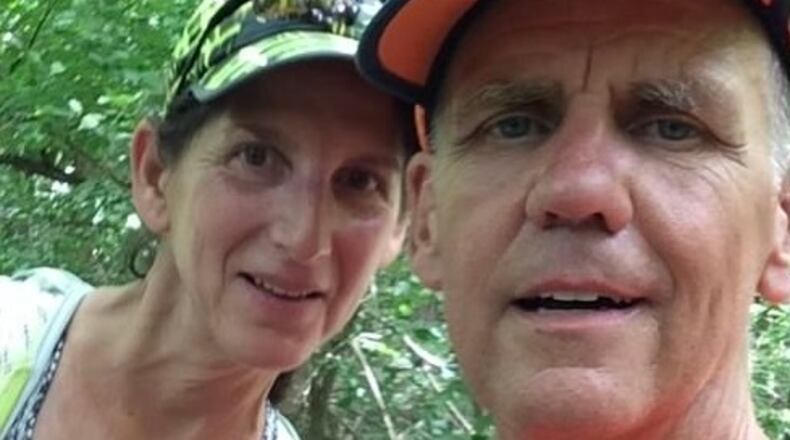“As much as I may have helped her, she opened my eyes, too,” said Wirick, 69.
Dee Char was connected with Wirick through a mutual friend when she wanted to take on trail racing. Char, who was born with a retinal degenerative disease, had run marathons and had completed a triathlon, but she needed assistance with running trails.
Char nominated Wirick as a Dayton Daily News Community Gem for helping her navigate the unpredictability of nature. Road routes have a consistent path and few obstacles, but trails have constantly changing terrain.
Char, 60, has some visual acuity but no peripheral vision and can’t see well when she is moving.
“A lot of times in the woods, you have to feel the environment,” said Char, who might notice as her guide’s foot crunches leaves or patters across a footbridge. Roots in the ground and branches overhead offer other clues.
Really good trail runners tend to have amazing eye-foot coordination, Wirick said. Blind runners can’t depend on that but need to feel confident and comfortable with their guide.
“You develop a lot of trust with blind people,” he said. “They have to trust you.”
Char and Wirick worked out how best to communicate, and their relative heights also worked to her advantage. Wirick is taller, so he could see above and around Char when he was behind her. Char likes to run in front of her guide – she can hear him better while still being able to take in the environmental cues.
Wirick ran with Char for several months in 2016, training for hours each week at Sugarcreek MetroPark and other trails. After a while it wasn’t only about him helping her train, she said. It was simply two friends going for a run.
“I think his mindset and attitude and understanding changed a lot along the way as well,” she said.
He would take her to the airport and ask if she needed anything at the grocery store, she said. He also helped her scope out a trail course in Middletown several years later, and he will still reach out periodically.
Since the time that they trained together, Wirick has begun to help another blind person as well. For a year or two, he and the man, now in his 80s, would walk together several miles each week. Wirick eventually became not only the man’s friend, but his power-of-attorney. Wirick helps him with tasks like getting groceries, going to medical appointments and even finding a new cellphone and teaching him how to send text messages. In the summer you might find them together at big band concerts at RiverScape MetroPark.
Assisting people with visual impairments isn’t something that Wirick set out to do. But he admires his friends and has learned a lot along the way.
“When someone is trying to do something for themselves, it’s easy to help out,” he said.
About the Author
